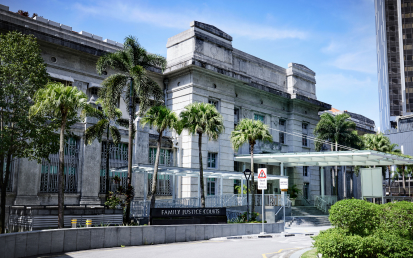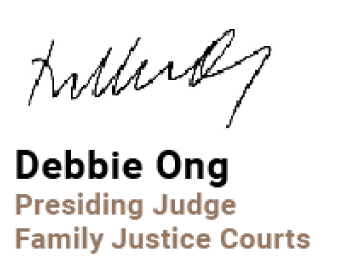How was 2021 for the Family Justice Courts (FJC)?
2021 was a very busy and fruitful year. It followed our milestone Workplan 2020, titled “Today Is a New Day”, where we intentionally adopted Therapeutic Justice (TJ) as a new system of family justice.
A mindset shift is needed because litigation, including family litigation, has traditionally been adversarial in nature. It is backward-looking and focused on assigning blame and insisting on one’s rights. TJ requires a whole new mindset involving all users of the family justice system including the parties, judges and lawyers.
So, our theme for Workplan 2021 was “A New Tomorrow”. It was a plan to implement all the changes needed to move to this new mindset and carry out the various operational parts of Workplan 2020. This required much hard work.
Apart from that, our caseload increased by 4%, including a 2% increase in the number of divorces. With hard work and dedication, we restored disposition rates to pre-pandemic levels and even increased the proportion of divorces resolved amicably on the simplified track from 60% in 2020 to 63% in 2021.
What were some of the highlights?
A key thrust of TJ is the focus on problem-solving and moving away from litigation that assigns blame. We focused on empowering court users, particularly unrepresented litigants, to better access and navigate the justice system and develop durable solutions for their disputes.
I will highlight four notable initiatives:
- We launched the Divorce eService portal in November 2021. It reduces time and effort for form-filling by populating forms with litigants’ personal details from Myinfo. It also guides litigants by converting their details into auto-generated court forms should they file for divorce on the simplified track.
- We mooted the Panel of Therapeutic Specialists in September 2021 to assist parties with complex issues underlying their legal disputes. The Panel comprises private-sector mental health and social science professionals who can serve as an additional avenue for such parties to obtain targeted therapeutic assistance. The initiative is now in its pilot phase.
- We developed Family Justice @ Heartlands in partnership with the Ministry of Social and Family Development and the Law Society of Singapore. It involves webinars that inform interested members of the public about their rights and obligations in family disputes. Two pilot webinars have been held since December 2021, with attendance by grassroots leaders who, as community touchpoints, are well-placed to help residents in need.
- Finally, our Video Bites are a series of instructional videos on Adoption, Access, Guardianship, Maintenance, Probate and Mental Capacity Act proceedings. They are freely accessible on the Singapore Courts’ YouTube channel and website.
 PANEL OF THERAPEUTIC SPECIALISTS
PANEL OF THERAPEUTIC SPECIALISTS
First announced in September 2021, the Panel of Therapeutic Specialists was conceived with the aim of making therapeutic specialist services more accessible to court users and their families.
Were there any challenges?
Definitely! Family practice has grown in complexity.
- We have disputes that transcend multiple areas of law, including property and trusts, restitution and unjust enrichment, as well as third-party claims to matrimonial assets.
- We encounter cases that require perspectives from other disciplines including social science (especially for children’s issues) and financial accounting (especially for novel and complex classes of matrimonial assets to be divided on divorce).
- Other cases engage issues of social and public policy, such as when a father in a same-sex relationship applied to adopt his child who had been conceived through surrogacy and later also applied for his partner to be appointed as the child’s guardian.
- Finally, family disputes are globalised today. We see increasing applications for children to relocate to another country, and for financial relief following a foreign divorce.
We have taken the opportunity at this milestone point in our development to fortify the capacities and capabilities of our judges and lawyers, who are the TJ “software”.
Our ongoing training for family judges includes my periodic Huddles with colleagues and the Group Supervision Scheme overseen by our Chief Mentor. We also held a Learning Week in 2021, where we heard from social science experts and international thought leaders on the FJC Advisory and Research Council.
For family lawyers, we developed the Family Therapeutic Justice Certification Programme together with the Law Society of Singapore’s Family Law Practice Committee and the Singapore Academy of Law. This programme assists lawyers to build new capabilities to practise effectively in a TJ-oriented family justice system.
These efforts have improved the quality of jurisprudence and advocacy in the family courts. I am grateful for the support of both the Bench and the Bar for this achievement.
Describe 2021 for the FJC in five words.
“Committed to a clear vision”. Workplan 2020 had set out a bold and clear vision, but it required huge changes and tremendous work. So, 2021 involved a deep conviction and commitment towards that vision. The hard work of all my colleagues reflected that.
What can we look forward to in 2022 and beyond?
As illustrated by our Workplan 2022 theme, “Let’s Go!”, we will continue to implement and translate our ideas into real-world solutions.
These solutions fall into three broad categories:
- Creating a multi-disciplinary environment to further TJ by tackling the social, psychological and other challenges that underlie family disputes.
- Fortifying judges’ and lawyers’ capacities and capabilities to handle family disputes of growing complexity.
- Strengthening and facilitating court processes, settlement and enforcement. For example, we are working with the Public Service Centre to bring services such as filing applications to community touchpoints in the heartlands.
We are planting the seeds for a family justice system that supports families to find a positive way forward. I am confident that by helping families, staying patient and working hard, our labour will bear fruit.

 Reframing Teaching and Learning
Reframing Teaching and Learning
A new certification programme and conversation circles on therapeutic justice
